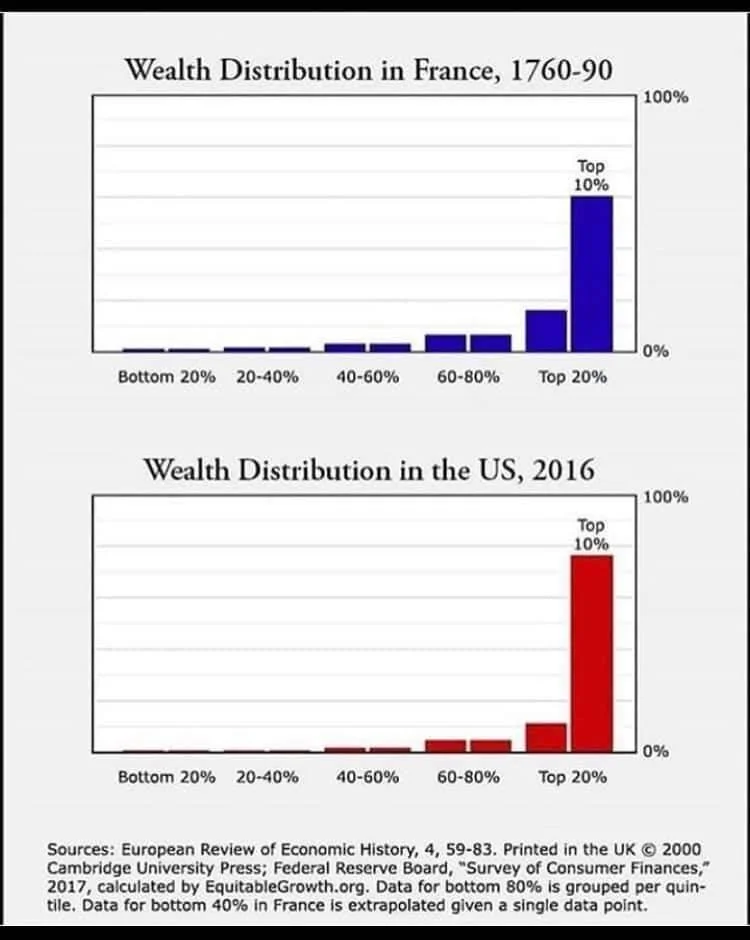- cross-posted to:
- politicalmemes@lemmy.world
- cross-posted to:
- politicalmemes@lemmy.world
The wealthy are much better off though. If you looked at the wage increase of the top 1%, if has risen by $800,000 a year (https://www.commondreams.org/news/2019/12/09/staggering-new-data-shows-income-top-1-has-grown-100-times-faster-bottom-50-1970) since 1970.
So capitalism is working exactly the way it is supposed to. Exploiting the middle and lower classes for the rich. This is exactly the progress they want.
Much more than that. The richest men in the country doubled their net worth this year alone.
But… I stopped going to Starbucks and quit buying Avocado toast? Can I buy a house yet?
You’re posting here from a mobile or computer, right? Unless that PC is at the library, you’re paying an internet bill of some sort! /s
Ugh, so lavish. I bet this guy also owns a water heater. No wonder he’s poor!
Well there at a library right? To use a library computer you need a library card, and we can’t expect poor people to be responsible with a library card. Obviously the commenter is irresponsible with their money paying late fees. Maybe if they stopped buying a new phone every year, or wasting money on a library they could buy a house. However keep buying the new phone we make because the shareholders demand higher returns each year. They need to do as we say and give us their money but it’s their fault for any consequences they face for us forcing them to give us their money. A perfect capitalist system. /S
I blame Reagan.
You have good reason to.
Reagan ruined everything.
Oh oh I got one too. Your McChicken, since 2014 alone, has risen in price 200% from $1 to $2.99. Along with most of their other items. They’re artisan dining now, not fast food.
https://www.voronoiapp.com/economy/How-Have-McDonalds-Prices-Changed-Since-2014-1392
Yeah, this kind of comparison really drives it home. The inflation figures, while not cooked in some grand conspiracy sense, really completely fail to capture the real price increases experienced by real people.
The limitation of CPI is that it is designed for one specific thing, but we end up using it for others. If you want to measure the value of a commodity over time, like a bushel of wheat or a barrel of oil, CPI is OK for that. A bushel of wheat or a barrel of oil now are pretty similar to ones in 1970. But most goods we purchase are not so directly comparable. The CPI calculation tries to compare like goods to like goods, and it applies adjustment factors to the price of goods that aren’t constant through time. For example, the TV you can get in 2024 is far, far better than one you could get in 1970. In CPI terms, this means that the real cost of TVs has plummeted by orders of magnitude.
But it goes beyond electronics. Think of homes. People will wring their hands and decry Americans as greedy by citing the size of new homes today vs in 1970, as they have significantly increased. But it’s not a matter of greed; you simply cannot buy a new 1200 ft^2 modest home in post places in the country today. They don’t make them anymore. Zoning has so restricted housing construction that all new housing has to be luxury housing. Yes, if you actually could find a duplicate of some c. 1970 1200 ft^2 home built new today, it would likely be quite affordable. But in terms of both size and construction details, it’s not legal to build homes like that anymore. But this won’t show up in the inflation figure. They’ll compare the 1200 ft^2 entry-level home in 1970 to whatever rare example of that they can find that is built today of someone building one of those in unzoned farmland in rural North Dakota, and conclude that house prices haven’t risen so much. In reality, no one can actually find those homes near job centers.
Or consider college. The college experience of 2024 is vastly different from that of 1970. The MBA class wormed their way into university administration and kicked all the actual academics out of admin. The MBA class see the kids as “customers” rather than pupils or students. And all the colleges and universities, even the state ones, went into MBA customer-seeking overdrive. Colleges have been luxurified. Big fancy dorms, extravagant student unions and study spaces, decadent gym facilities, etc. College at a state school in 1970 was 4 people crowded in a tiny dorm room, where your ‘gym’ was the campus running track. CPI looks at what it would cost to run a 1970s-style university in 2024, and concludes that college hasn’t gone up in price as much as it has. This is one reason community colleges have remained so relatively affordable. By their nature, they deal mostly with commuter students who wouldn’t want to use your stupid fancy gym even if you built one.
And the same thing for vehicles. Automakers have chased higher and higher rates of return by making bigger and heavier vehicles. Yes, if you could find a car made today that was an exact duplicate of a 1970s vehicle, it wouldn’t have inflated as much. And that’s what CPI shows. But it doesn’t capture the actual buying options Americans have at their fingertips.
Ultimately, here is what you are doing when you use an inflation calculator and put in 10,000 in 1970 and calculate to today. You are fundamentally saying, “consider the kinds of goods and services average people bought in 1970. If I bought that exact same basket of goods, literal exact duplicates, what would they cost today?”
And for economists, that kind of analysis is useful. If you want to calculate interest rates and GDP growth, CPI works great for that. But for real people in the real world, they cannot simply live like it’s still 1970. The affordable options they had then simply no longer exist in the market. Sometimes things have changed for good reasons like product safety, but more often it is simply because the MBA class has turned everything into a luxury good to maximize return on investment. Everything has become a luxury good aimed at the top 20% of earners. And our policy tools for dealing with inflation have been utterly unprepared for this.
That sounds interesting but are you sure it’s correct? My understanding is that CPI traces a bundle of goods that is typical at the time. This means that current CPI contains a current TV while 1970 CPI contains a 1970 tv. CPI inflation is the relative price change of these typical bundles.
My understanding (but again correct me if I am wrong) is that the type of technology adjustment you discuss affect GDP, but not CPI.
What I’m getting at is hedonic adjustment in economic terms. The BLS specifically tries to factor out the effect of increased quality of goods. They don’t just look at what’s typical at any given time, they specifically and explicitly want CPI to show the underlying change of goods in relation to the money supply. If overnight, the quality of all goods doubled but the price also doubled, the CPI rate for that change would be 0%. CPI says that you’re now effectively buying twice as much stuff for twice as much money, so no real inflation has occurred.
This is the primary cause of the disconnect people experience between the figures they see on the news. Kamala tried to run on, “real wages have never been higher!” She was comparing wages measured in CPI inflation. People then looked at their actual lived experience, the actual price of actual goods and services they purchase, and concluded she was lying. Yes, if you’re just talking commodities, an hour of work today buy more of basic commodities than at any time before. For ascetic monks who wander the Earth and never buy anything other than bulk rice and beans, there’s never been a better time than now. But for people just trying to live a life of some basic dignity and comfort, they find that the only options available in category after category are things that would have been considered luxury versions of products generations past.
The ultimate cause of a lot of this is corporate consolidation. The entire economy is owned by a handful of major investment funds, and most goods have only a handful of suppliers. And the consultant/MBA class at the top all copy each others’ homework. They ultimately have very few ideas. In a free economy, some companies in a sector could try to offer discount goods, like many industrialists have done in the past. But it’s currently fashionable in the oligarch class to pursue a strategy of maximum profit per minimum unit, rather than trying to make modest profits per unit and make big profits through huge sales. And since the same small club of people effectively controls every publicly traded company, they all end up following the same strategies. All of them are following the strategy of “turn my market into a luxury good, as that has a superior profit margin per unit sold.” What we’re seeing is a direct result of the cult maximizing shareholder rate of return. If you want to maximize profit while absolutely minimizing capital investment, then you have to pursue a luxury brand strategy.
Today I learned. Thanks.
More than 50% of classes in universities are now taught by poorly paid adjuncts with no benefits who can have their classes cut up to the day before classes start. It’s insane what the MBAs have done to higher education.
And the difference went to fill the coffers of the rich.
Income inequality is also much higher than it was in 1971, it’s about where it was at the start of the Great Depression
Don’t forget that Medicaid and Social Security Disability still have the same $2,000 MAX asset limit (aside from a car and low-value residence). Back in 1974, that was a down payment on a house. Now that isn’t enough to rent a place to live, not enough to fix a car, and if you somehow have more than $2k in assets,( (DHS does bank and tax monitoring) they take your medical and food away, despite being disabled. If adjusted for inflation, it would be about $13k. Enough to put a down payment on a small house. A 2k limit enough for people with disabilities is BARBARIC.
I’ve written to so many politicians about this archaic rule and Lisa McClain told me that it’s that low, so that only the truly destitute use it… despite us paying taxes all our lives to protect us from starving. I was told that the disabled weren’t as important as older voters who deserve retirement disability.
The most disturbing stat is that our contempt for the rich hasn’t really multiplied at all.
Speak for your damn self
Leaders don’t care about you or me. If we collectively can’t get off our lazy assess and force changes to happen that benefit us, they won’t. It’s really that simple. The working class needs to take responsibility for civilization back from politicians and corporations or well all continue to be genocided by the greed of a relatively few powerful human beings.
Leaders don’t care about you or me.
Too broad. Bernie clearly cares. Lots of politicians care. Not all, of course.
The problem is that not enough people care to figure out which is which. And somehow Matt Gaetz and Jim Jordan keep getting reelected.
Not really too broad. There are aspiring leaders who might care but they don’t end up leading. Bernie doesn’t seem to ever end up leading much does he? Business leaders keep choosing political leaders. It’s leaders everywhere, not just political leadership. People who run things don’t seem to give a shit about anyone but themselves and they meddle in everything to make sure leaders help them first and foremost. Half the political class also is the business class so…
Also one exception tends to prove the rule. The vast majority of our leaders, political and business, religious and cultural, are horrible fucking people who only do good when forced to and we have utterly failed as a citizenry to make sure they do.
AOC and Bernie and at least a couple dozen others are certainly not the choice of business. Sherrod Brown, Rashida Tlaib, Elizabeth Warren, Tim Walz, etc. The problem is that we have the attention span for maybe 12 names. The business cabals research and promote every name.
If you’re not researching your ballot at the least every time you can vote, then you’re contributing to the problem. Ideally you’re also spot checking some key votes and doing some deeper research into the vote topics that you’re particularly knowledgeable or interested in for spot checking.
Personally, I remember fewer names and have a bit easier time because I’m always voting against 90% of my incumbents. But you can’t just say things like “vote out all incumbents” and think that’s helpful. They’re really not all bad.
And nobody you listed has been in positions of significant leadership. The DNC stopped populist Bernie, Pelosi is shuttering AOC, none of them has been close to DNC leadership roles let alone the presidency. Bernie came into the DNC with his own political clout he built from outside the DNC which is the only reason he is where he is. DNC leadership actively suppresses changes in top leadership.
My point isn’t that good people don’t exist it’s that the systems we have seem to actively and aggressively prevent them from gaining any real power. Good people are a threat to the way things are being done and less than good people keep it that way.
the systems we have seem to actively and aggressively prevent them from gaining any real power.
Primarily by not getting enough votes. And those systems are advertisements, PACs, and control of the media.
If we could counter those systems, we’d have a pretty good shot at fixing it.
There are absolutely certain, very select places we should look at primaries to get more progressive candidates. Places like the West Virginia seat in the Senate held by a “Democrat” isn’t on that list, for example.
We should be very careful about which places we want to primary. The neolib-leaning Dems are not the primary problem in this country. They’re a relatively small (in comparison) factor.
My ideal is that the Dems win so much that the Republicans stop being a competitive party. One party rule isn’t going to last long. We’d have the same kind of infighting that either party has now when they get control, and if the “one party” thing lasted long enough, it’d split. THAT would be the time to gear up against the neolibs.
I understand this is a slow, frustrating process. And who knows if we can even keep traction to get started. But most importantly I’m sick of our getting stuck in the mud and deciding that the problem is that we’re not slamming the pedal hard enough.
The first stat is a little misleading IMO. While the median car cost has increased ~2x (inflation adjusted), an entry level car price has only gone up ~1.2x (1971 AMC Gremlin vs 2023 Kia Rio LX; $1.8k/$14.8k vs $17.8k) and that’s more important for measuring relative quality of life.
Of course add on to that the fact that there’s easy access to second hand car markets and the number of features included with that base model vs the 1971 AMC Gremlin and it doesn’t seem like things are much worse.
Basically, average car prices increasing could just indicate that people are willing to spend more on cars for whatever reason that may be (better features, more car-centric culture, etc.). For this reason I’d like to see similar stats but about entry level options within each category. Probably less sensationalistic but still interesting.
That being said, I bet stats for the housing market and others would still show a notable increase even at the entry level, but I’d still like to verify this before blindly jumping on the sensationalist bandwagon.
I also want to know what those $25k houses are selling for now. Comparing to houses built in 2024 is stupid.
In 1988 my family home in the UK was 33k. We sold in 2011 for 185k. My house in 2014 cost 118k and is now worth 195k.
So, it’s not that stupid.
So the 1988 home sold for about 6 times its purchase price and and the 2014 house is 1.65 times its purchase price. Both of those are way less than the 25x that the image claims.
But the graphic is stating from 1971 so 18 years before the 1988 house. In 1971 the average house price in the uk was about 5k.
You are the one conflating here.
Then provide the 1971 to 2024 numbers. A house built after 1977 can appreciate much less than a house built in 1971.
deleted by creator
Our progress party was compromised, and by compromised I mean bribed to work against progress starting in the 1980s. Today’s neoliberals.
Both parties are well paid to protect the rigged economy that exploits you that they spent decades rigging against you from you, while they war about social issue symptoms you get to vote on for the illusion of freedom.
We don’t get a vote on shape or priorities of the economy. Well bribed Republicans and Democrats will lock arms, declare martial law, and authorize lethal force on us before they’ll let the people end their legal Wall Street bribe gravy train. A shining example of why legality should never, ever be conflated with morality, especially post Reagan.
That’s where we’re at and why. Jimmy Carter was the last POTUS who wasn’t all in on turning their constituents into desperate capital batteries. That is a prerequisite for party support.
Up vs. Down. Large shareholders vs everyone else. Everything else is dancing to their pfife. Pity their class traitor capitalism worshipping sycophants, but our true enemies can be identified by net worth.
B…b…but you have smart phones!
The cake is being eaten. They let us eat it and we ate it.
But screens have gotten cheaper per unit of area!










